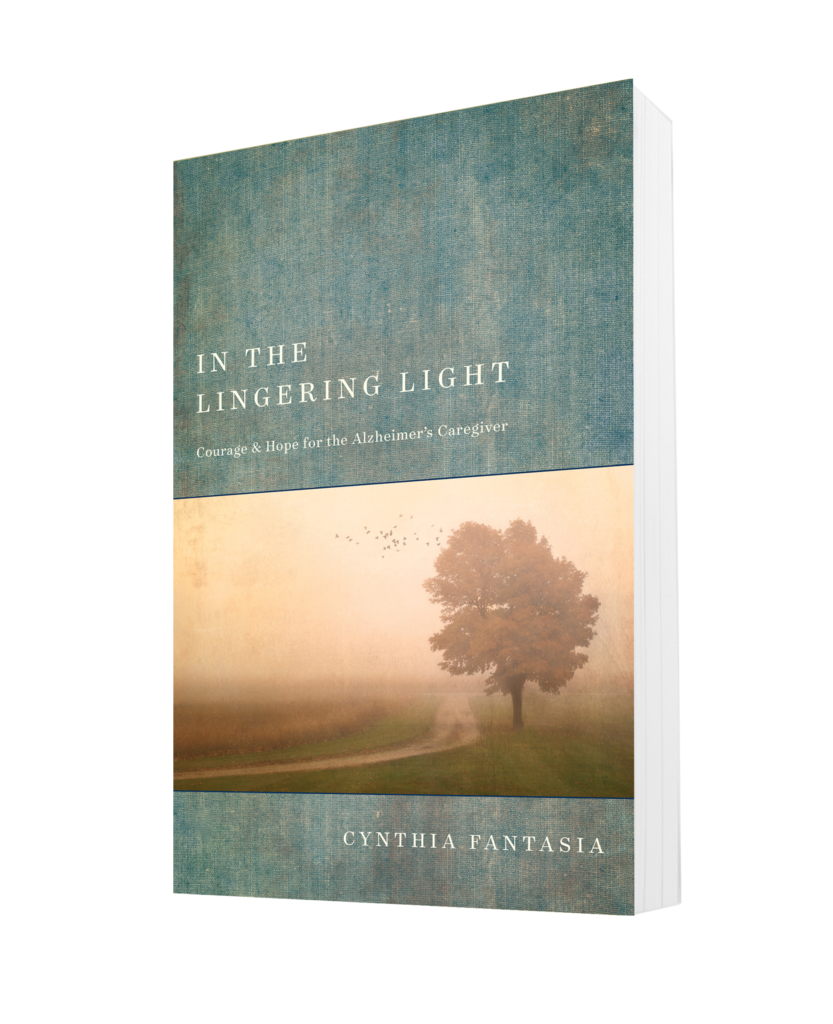by Cynthia Fantasia, author of In the Lingering Light: Courage and Hope for the Alzheimer’s Caregiver
This is the start of a three-part series on Alzheimer’s caregiving. These three articles contain thirteen lessons I learned (and am still learning) as I cared for and walked alongside my husband through his journey with Alzheimer’s Disease. May the truths I learned strengthen you for your ongoing journey. Because one thing I have come to realize: God doesn’t waste anything. Lessons will come at the end of the journey. So let’s begin.
God allows us to experience the low points of life in order to teach us lessons that we could learn
in no other way. – Stanley Lindquist, True Genius
The journey as an Alzheimer’s caregiver for my husband is over. He is safely at his destination. I’m on a new journey now.
Looking back, I notice insights I have gained and valuable lessons that have enriched my life. Our trip contained some very painful moments . . . and some very sweet ones.
I hope it has strengthened my faith. The prospect of growing old alone (although I am so grateful I have family and friends) does not excite me. But if God has brought me through this trip, He can and will take care of me the rest of the way as my solo journey now continues, on another uncertain road. I must look ahead, but every good driving instructor will tell you that an occasional glance in the rearview mirror is important for safe travel.
James reminds us in the opening chapter of his epistle:
Consider it pure joy, my brothers and sisters, whenever you face trials of many kinds, because you know that the testing of your faith produces perseverance. Let perseverance finish its work so that you may be mature and complete, not lacking anything.
While I don’t believe that God tests us, I do believe that He allows certain life experiences so we will grow and our faith will be strengthened. There were many times during those thirty-four months as Bob’s caregiver when I wanted to have a conversation with God and ask just what it was that I was supposed to learn. “Give me a book, Lord,” I would say, “and I’ll read it and learn all the lessons necessary for a whole and complete life.” But a book was not part of the process. Real learning happens only from real experience.
Many years earlier, a friend had shared this insight with me from the book of Genesis: Joseph did not learn any lessons during his time languishing in a pit (Genesis 37:23-28). Yet God used the pit to form insights and convictions that would shape Joseph and an entire nation (Genesis 50:20). No lessons were learned while Alzheimer’s came close and became personal. But I clung to my belief that God would not waste anything, that He was still sovereign, and that one day, I would emerge from this valley—how and when, I didn’t know.
Each day of those thirty-four months took perseverance, total reliance on God, and trust. Yet these truths had to be relearned each day. Now that I have emerged a bit from my valley, I have done some hard thinking. Looking back has helped me look forward.
Over the next few weeks, I will share three articles containing thirteen lessons I learned (and am still learning). I pray that there are some truths here that will strengthen you for your ongoing journey. Because one thing I have come to realize: God doesn’t waste anything. Lessons will come at the end of the journey. So let’s get started.
People Grieve Differently
It has been almost two years since Bob went home. I still weep, but not from sadness. The tears come when something stirs a sweet memory: “Bob would have loved that joke,” or “Our grandson said that just like BobBob would have.” When one of our children or grandchildren reaches a milestone, I think how proud Bob would have been. I view these tears not as a weakness but as a tribute to my full-of-fun, kind, and encouraging husband.
Accept Reality
The harsh reality of Alzheimer’s disease is that the diagnosis is a shock and the prognosis is a death sentence. At this point, there is no cure, and medications provide only minimal and temporary help.
I had learned the medical statistics, so I was not going spend time trying to find a doctor who would offer some wonderful, miracle cure. Nor would I listen to well-meaning folks who told me about some amazing new diet that reverses memory loss. I would just smile and say that the concept was interesting, but I knew the grim facts. In my mind, I’d remember a greeting card I bought just for me:
SORRY, THE LIFESTYLE YOU ORDERED IS CURRENTLY OUT OF STOCK.
Once, when speaking at a neuroscience symposium and sharing about life as a caregiver, I was asked if I had read the book Still Alice. I responded no, and I explained that I believed Bob was not “still Bob.” I had to learn to embrace who he was at that moment and in all the moments to come.
Where did all my wisdom come from? Certainly not from me. I was still stumbling and learning. But the Bible says that “if any of you lacks wisdom, you should ask God, who gives generously to all without finding fault, and it will be given to you” (James 1:5). Accepting reality helped me to live in the moment and trust Him for the future.
I learned that lesson daily, because I had no idea what tomorrow would bring.
Life Is Short—Be Kind
It was one of Bob’s favorite statements: From the time I met him, whenever I was hurt or upset by or about someone, he would always remind me, “Cynthia, life is short. Be kind.” Bob lived those words. I don’t know of anyone who would say that Bob ever uttered a sharp word to them. He spoke truth but with kindness.
When he would go for a walk with one of his Team Bob friends, they would return and tell me how Bob stopped to talk to everyone, always offering a word of encouragement. The police officer walking through the center of town, the woman at Dunkin’ Donuts who loved to serve him, the distant neighbor working in his yard—all received kind words of encouragement from a man who had no idea who he was talking to but considered each a friend in need of a kind word.
Toward the end of Bob’s earthly journey, when he was heavily medicated and had to be fed, the hospital staff would continue to tell me (sometimes with tears in their eyes) that each time his meal arrived at his place, each time a staff member finished feeding him, Bob’s response was always “Thank you!”
Every morning, I ask the Lord to give me an opportunity to be a blessing, to extend kindness to someone. A lesson learned from a man who practiced it daily.
It’s the Disease Talking
Very early in my journey, my friend and colleague Dana shared these vital words with me—words that sustained me throughout our uncertain road: “It’s the disease talking.” Dana was ahead of me in her mother’s Alzheimer’s journey, so she spoke with validity and was a voice of experience. Four simple words, yet they were life-giving. As Alzheimer’s robbed Bob of his personality, he sometimes spoke words that were hurtful, sad, and even downright mean. Yes, even kind people can say hurtful things. “It’s the disease talking” became the filter through which I received these words, and that filter protected my heart. I attributed the words to the disease and not to Bob’s heart toward me.
Of course, there were times when I felt like I was at the end of my rope. What should I do? I had to acknowledge my very human frustration. At these challenging times, I would turn away for a second or two and scream silently at the wall. As strange as it seems, I then found myself more able to deal with the situation at hand.
I shared my “scream at the wall” discovery with a friend a bit behind me in her uncertain road of Alzheimer’s. She called me a few days later and said, “It works! Thank you so much.”
I find great comfort in the words of Darlene, a dear friend who is a caregiver to Alzheimer’s folks: “Alzheimer’s cannot steal our souls. It can hold the mind in its sharp grip, but never the soul.” It was, and always is, the disease talking.
Build Holy Habits
A habit as an acquired mode of behavior that has become largely, if not completely, involuntary. Bob seemed to learn the secret of holy-habit living early in life, and, until the disease completely took over his mind, he lived those habits: encouragement, contentment, and trust.
I was always amazed at Bob’s attitude. Though confused so much of the time, though dependent on me for every decision, though unable to conduct any meaningful conversation, though unable to read and eventually write, Bob trusted God.
Intentionally build holy habits into your life to sustain you through the valleys when they come. A lesson learned from one who lived it.
You have just read an excerpt from the book, In the Lingering Light: Courage and Hope for the Alzheimer’s Caregiver by Cynthia Fantasia. (c) 2019 NavPress. All rights reserved. Read the first chapter here. Or buy at NavPress.com or your favorite retailer.



Just got the book. Read the first five pages and had to stop. The fog, I’m still processing my 87 year old mom’s new diagnosis. Internally I’m numb, hoping this book will help get me ready for what is to come. Clueless as to what to do, what to expect. Yes, the fog.